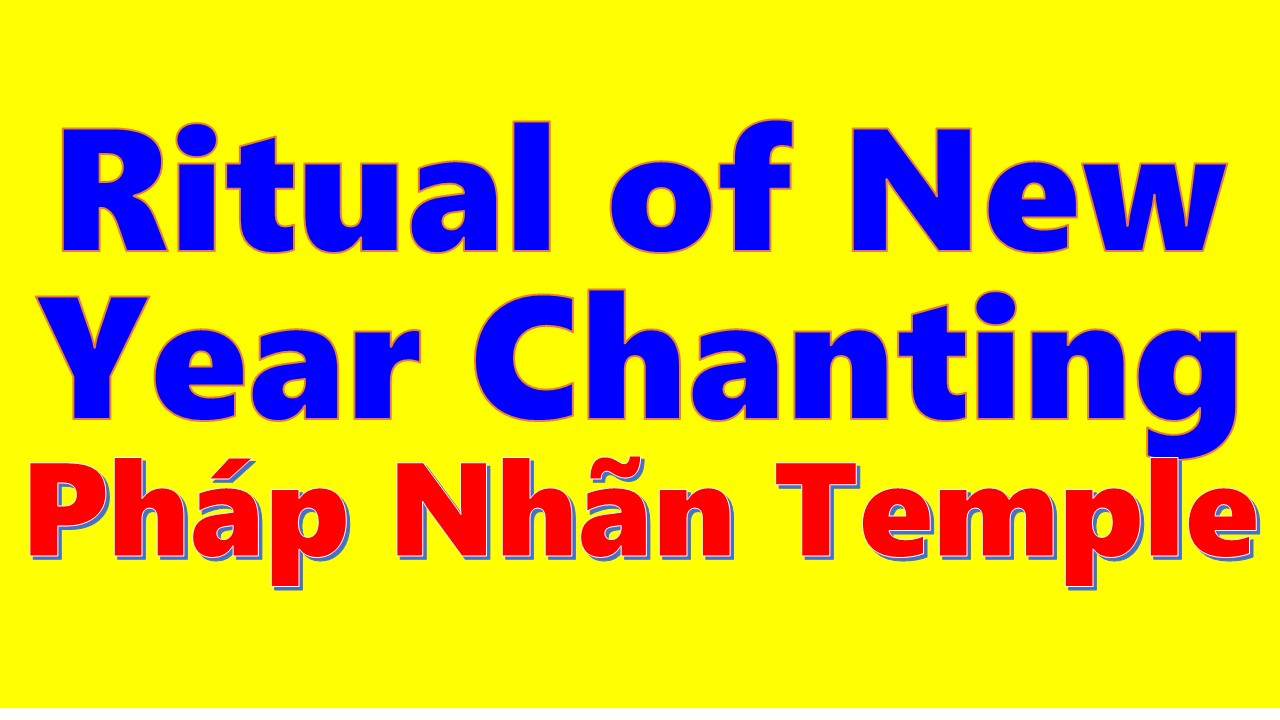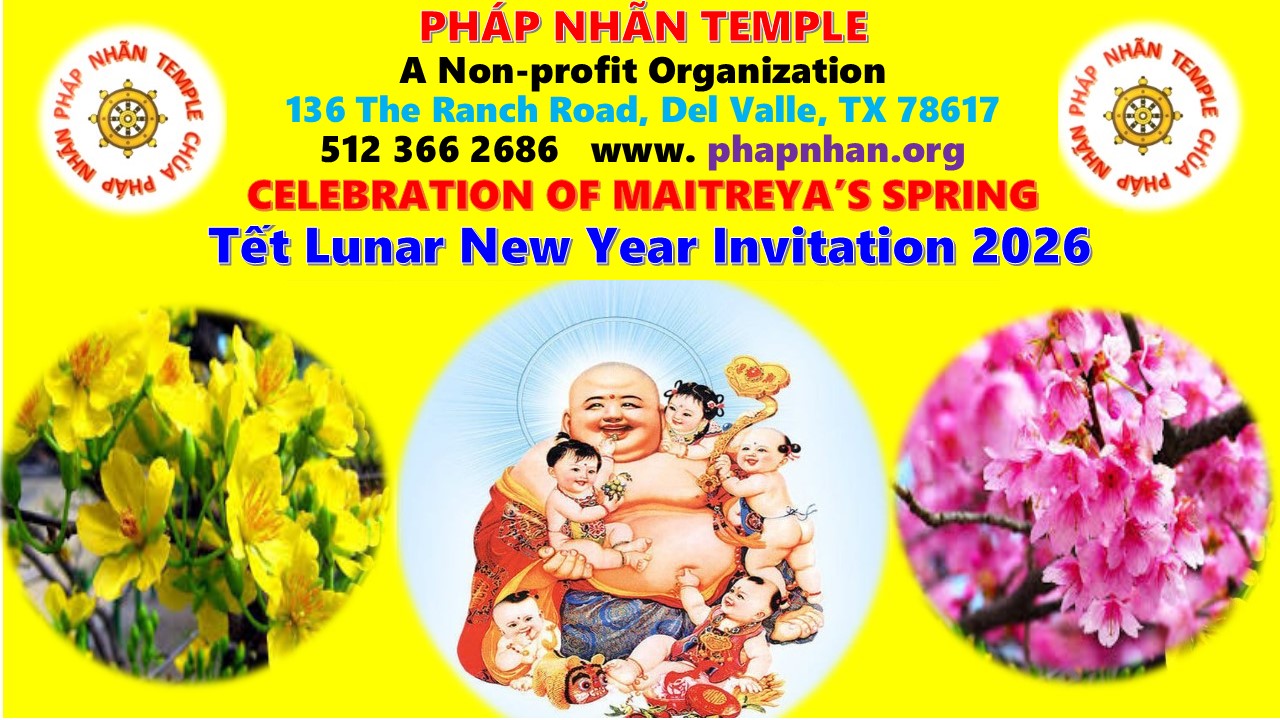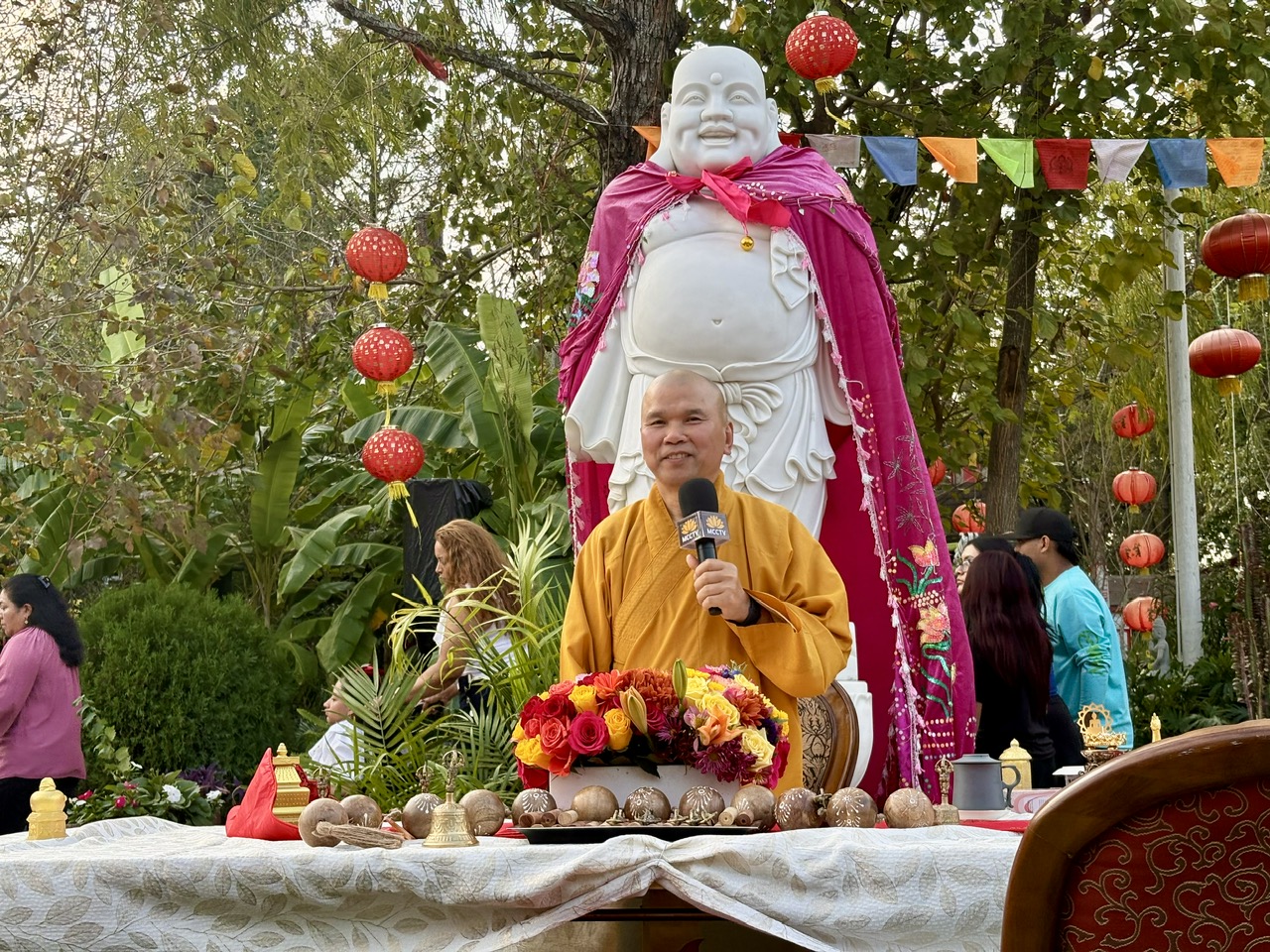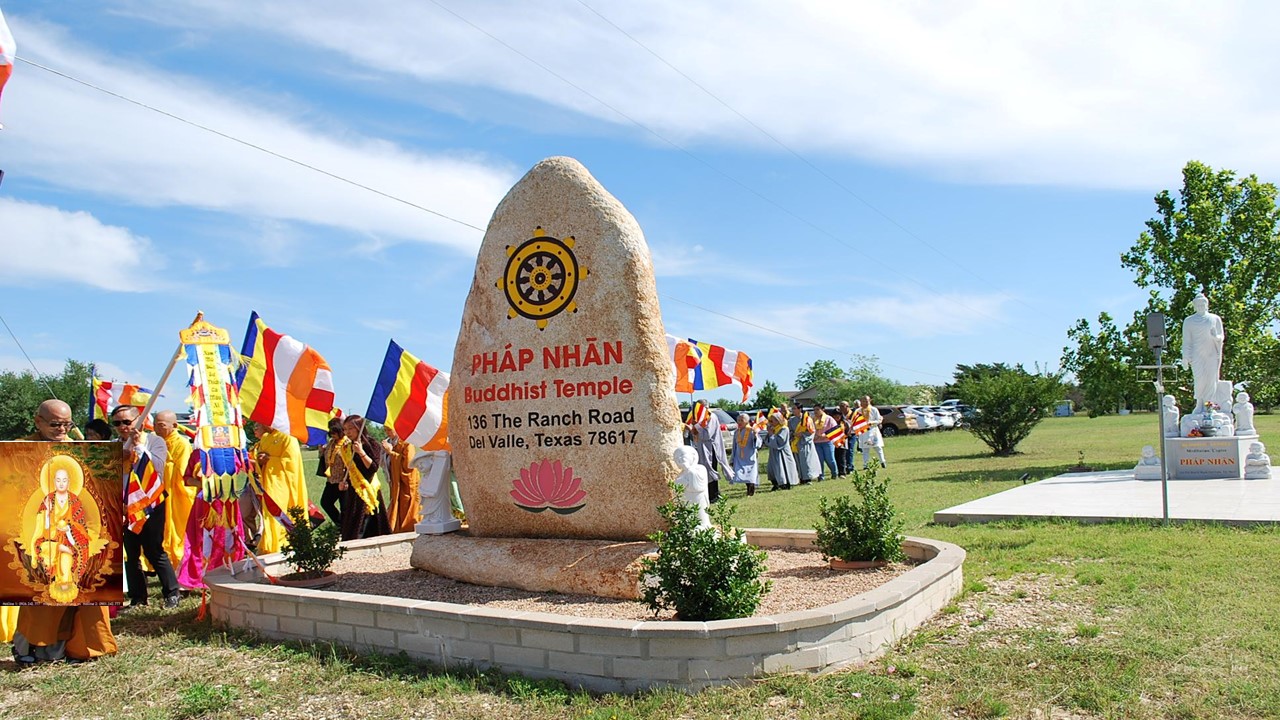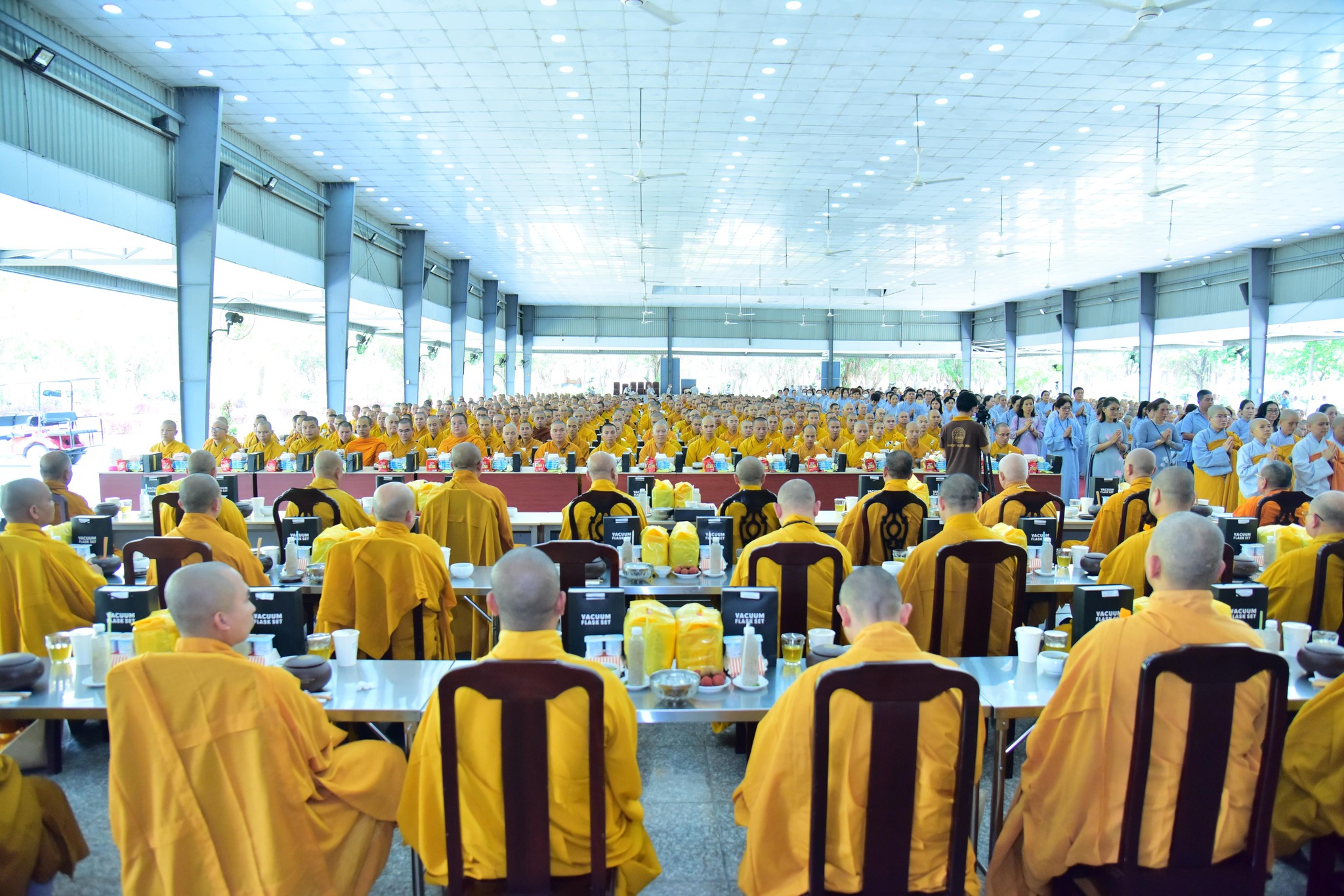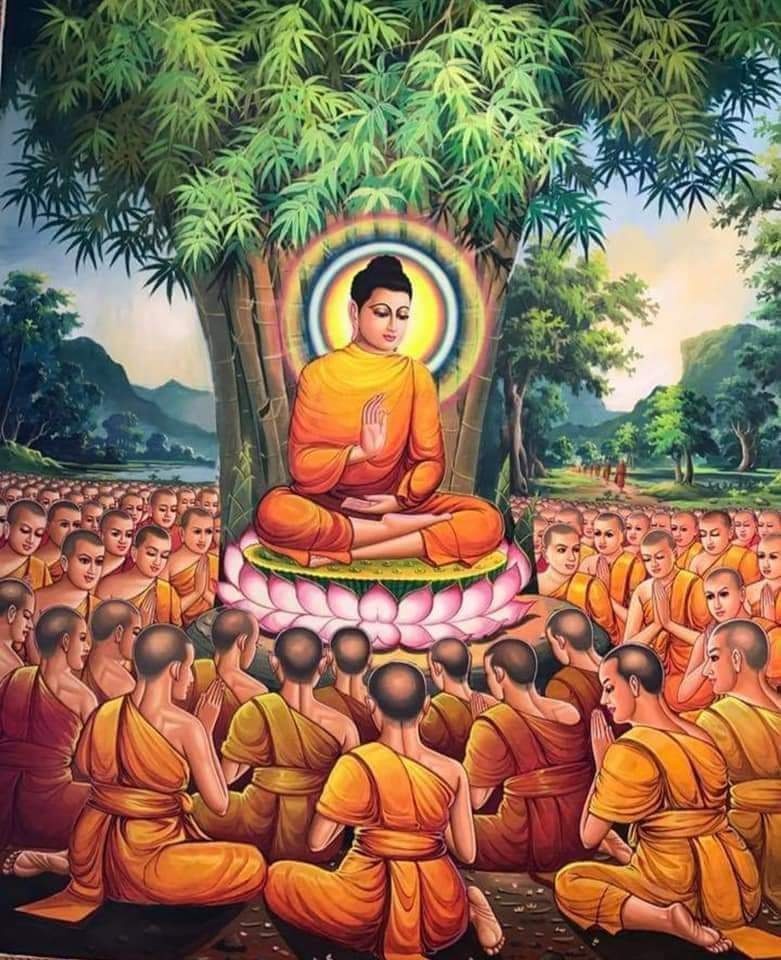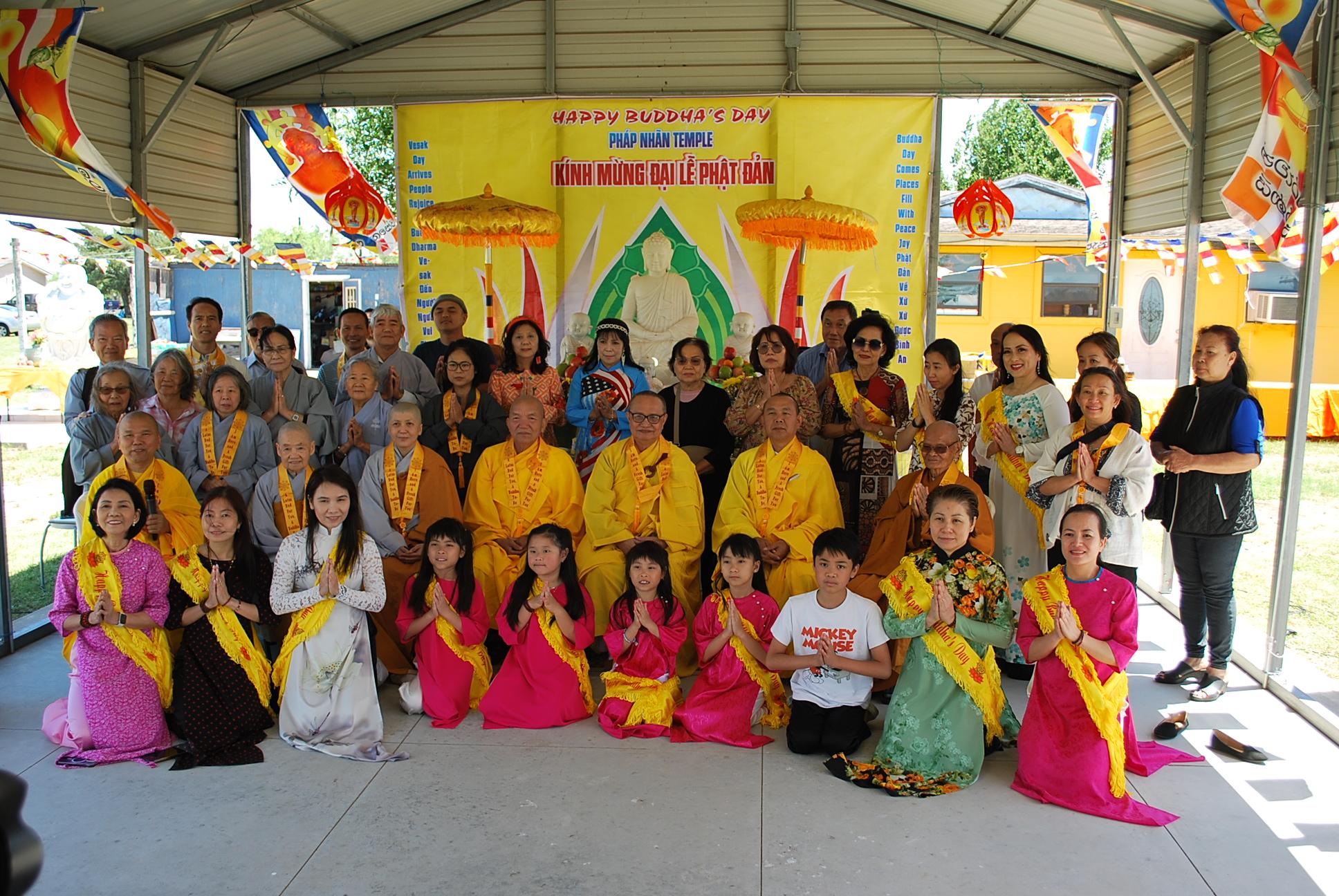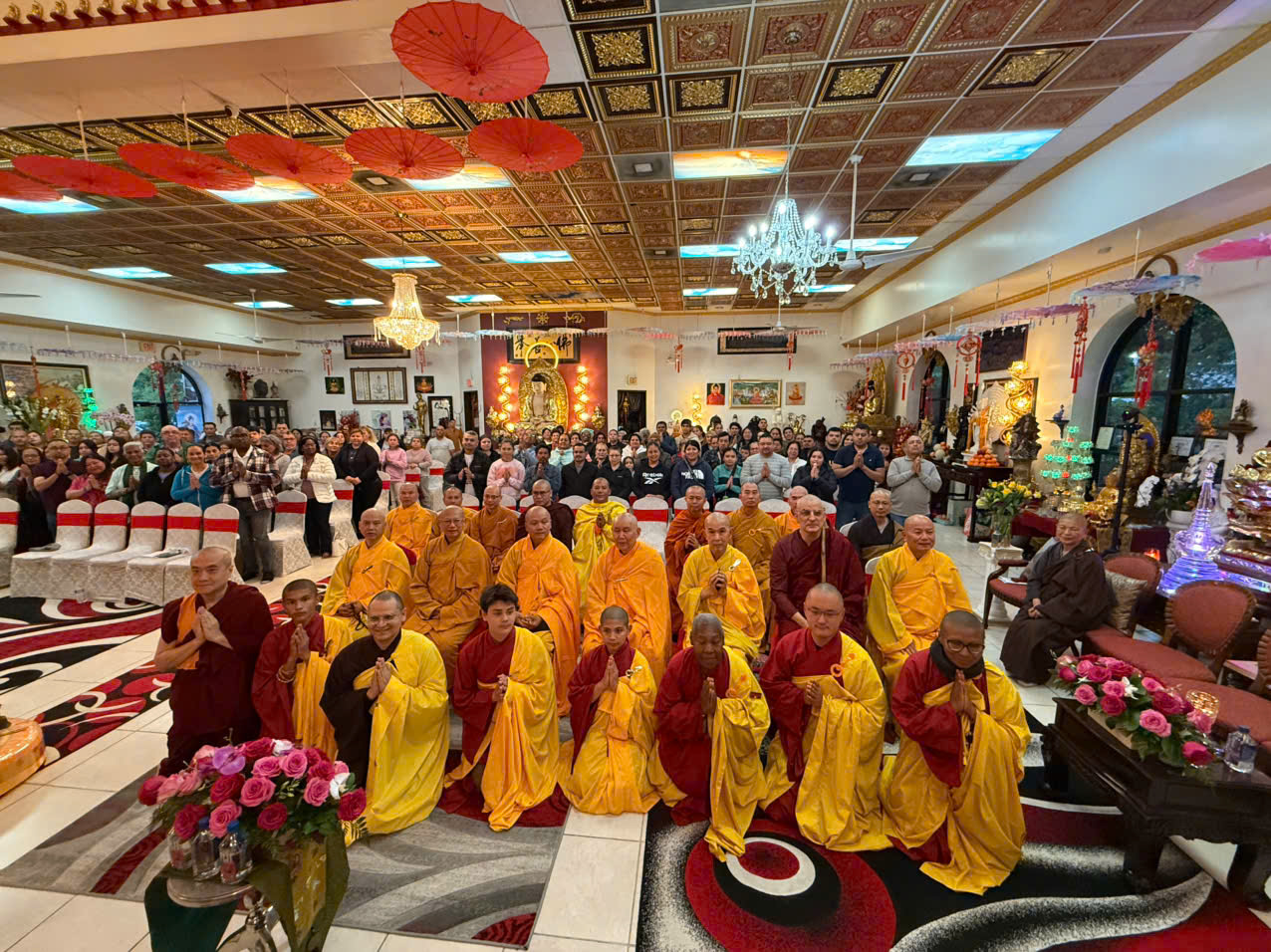.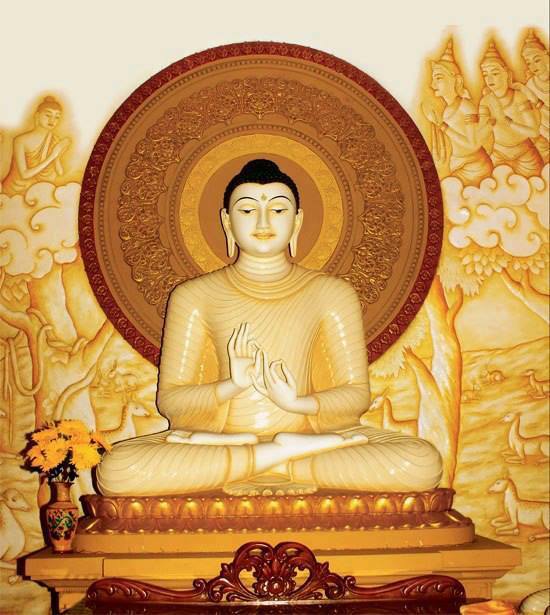
Namo Tassa Bhagavato Arahato
Samma SamBuddhassa
(Repeat x 3, Bell)
Respectfully pay homage to the Buddha: the World-Honored One, the Worthy One, the Exalted One, the Fully Awakened or Enlightened One. (Bell)
Incense Offering
As wonderful as the lotus flower,
as bright as the northern star,
let us come back and take refuge in
the Master of gods and human beings.
The precious lotus blossoms on the enlightened pedestal
the halo shines in all directions.
Wisdom goes beyond the dharma realms,
Loving-kindness and compassion permeate all over mountains and rivers.
I have just seen the Buddha’s perfect countenance,
My wholeheartedly sincere heart is to respectfully offer him,
I forward it to praise the Triple Gem
Diligence in the Dharma path is well cultivated.
As the incense is lit,
sandalwood perfumes the air,
making an auspicious rainbow cloud.
I, your disciple, with all my respect
offer it to the Buddhas of the Ten Directions.
May we practice the precepts seriously at all times
May we practice concentration diligently,
May we offer the precious fruit of insight as our offering of incense of the heart.
We would like to respectfully offer the incense of ethics, concentration, wisdom, deliverance, and that of deliverance with right view to the Buddha, Bodhisattvas, virtuous and noble Sangha, Dharma guardians, good gods, knowing and understanding our wholehearted minds. (Bell)
Touching the earth in deep gratitude to the Triple Gem
Praising the Buddha Jewel
The Buddha Jewel shines infinitely.
He has realized perfect understanding for countless lifetimes.
The beauty and stability of a Buddha sitting
can be in the mountains and rivers.
How splendid the Vulture Peak is!
How beautiful the light that shines forth from the Buddha’s third eye,
Illuminate the six dark paths.
The Nagapushpa[1] Assembly will be our next appointment
for the continuation of the true teachings of practices.
We take refuge in the Buddha ever-present.
We, your disciples, wholeheartedly pay homage to the Buddha forever present in the three lifetimes and ten directions.
(Bell, one prostration)
Praising the Dharma Jewel
The Dharma Jewel is infinitely lovely.
It is the precious words spoken by the Buddha himself,
like fragrant flowers floating down from the heavens.
The wonderful Dharma is plain to see.
It is recorded luminously in the three transparent baskets
handed down from generation to generation in the Ten Directions
so that today we can see our way.
We vow to study it with all our hearts.
We take refuge in the Dharma ever-present.
We, your disciples, wholeheartedly pay homage to the Dharma forever present in the three lifetimes and ten directions.
(Bell, one prostration)
Praising the Sangha Jewel
The Sangha Jewel is infinitely precious,
a field of merit where good seeds can be sown.
The three robes and the bowl are symbols of freedom.
Mindfulness trainings,
concentration, and insight support each other.
The Sangha dwells in mindfulness day and night,
providing the foundation for us to realize the fruit of meditation.
With one heart, we come home to the Sangha,
and take refuge in the Sangha ever-present.
We, your disciples, wholeheartedly pay homage to the Sangha forever present in the three lifetimes and ten directions.
(Bell, one prostration)
(Meditation practice around 15 minutes)
Open Verse
The Dharma is deep and lovely,
we now have a chance to see,
study, and to practice,
we vow to realize its true meaning. (Bell)
THE WHITE-CLAD DISCIPLE SUTRA
Thus have I heard. On one occasion, the World-Honored One was staying at Jetavana Monastery wholeheartedly offered by Sudatta Anathapindika and Prince Jeta. On a beautiful day, lay male devotee Sudatta along with five hundred devotees paid a visit and homage to Venerable Sariputta and other monastics. At that time, Venerable Sariputta used many skillful teachings to preach the Dharma to them, bring many joyful feelings of the Dharma practice, and help them arouse their confident hearts of thirsting for the Triple Gem.
Then, Venerable Sariputta led them all to a hut of the Buddha, prostrated at his feet, and sat down respectfully to one side in mindfulness and awakening postures. The World-Honored One considerately taught them the key things devotees[2] should be diligent to practice the Buddhadharma daily to bring peacefulness and happiness to themselves and to other people right in the present life. (Bell)
The key things, namely, are the Five Ethical Trainings and Four Noble Contemplative Minds. If devotees lead their devotional and exalted lives, and regularly practice them right in the present life, they can obtain perfect peacefulness and happiness, contribute to bringing authentic peace to the many all over the planet. Coming at the time of death, they certainly know that they will not fall into the three evil realms: Hells, hungry ghosts, and animals. Upon understanding and practicing so, devotees have the ability to cultivate, transform their bodies and minds, attain the stream of holy fruition right in the present life.
The First Ethical Trainings: Devotees who are determined to keep far away from all forms of killing living beings, including creatures. Be aware to nurture and arouse our loving-kindness and compassion hearts by protecting our and others’ lives. Not killing ourselves, not killing living beings by ourselves, not telling other people to kill living beings, not inciting other people to kill living beings, and not seeing other people killing living beings, we rejoice to follow them. Aware to protect the natural environment, give up weapons and violence, practice loving-kindness and compassion, transform anger and hatred, know to repent, correct, and be ashamed of wrong deeds. Thanks to understanding and practicing so, devotees have the ability to eradicate the roots of the intention of killing living beings, lead their lives of peacefulness and happiness right in the world. (Bell)
The Second Ethical Trainings: Devotees who are determined to keep far away from all forms of stealing, not to take what is not given, respect the possessions of other people, cherish almsgiving, help people go beyond needy circumstances, find joy before almsgiving, during almsgiving, and after almsgiving; almsgiving without regretting and almsgiving without expecting anything in return. Thanks to understanding and practicing so, devotees have the ability to transform and let go of their greedy and stingy hearts, lead their lives of integrity and altruism. (Bell)
The Third Ethical Trainings: Devotee who is determined to keep far away from sexual misconduct and adultery lives faithfully with a legal spouse, stays away from kids’ sexuality, spends a proper time looking after descendants, does not allow them to play violent games, limits them to play electronic games online, allows them to go to school, spends a suitable time helping them do homework, and teaches them understanding and love. Thanks to understanding and practicing so, devotees have the ability to build happiness for their families and contribute to bringing peacefulness and happiness to schools and to societies. (Bell)
The Fourth Ethical Trainings: Devotees who are determined to keep far away from telling lies – only tell the truth, do not say anything deceitful and false – only say reliable and confident words, do not say anything separate and disharmonious – only say words of construction and suggestions, do not say anything rude and evil – only say polite and elegant words, do not say anything useless and meaningless– only say useful and meaningful words, do not say anything despicable, contemptuous, and reproachful – only say commendable, appreciative, and solidarity words, do not say anything critical, hasty, stressful, and angry – only say loving, affable, pleasant, harmonious, reconciling words. Thanks to understanding and practicing so, devotees who are worthy to get confident, have the ability to bring prestige and peace to many people. (Bell)
The Fifth Ethical Trainings: Devotees are determined to keep far away from alcohols, intoxicants, smoking, and gambling, especially narcotics, to give up depraved and violent enjoyment habits, such as movies, newspapers, radio, television, not to buy, sell, product, and stockpile weapons and poisons, not to plant cannabis and opium, not to broker and trade in people and rare wildlife.
Be aware that the consumption and use of four kinds of daily nutriments comprise edible foods, feeling foods, volitional foods, and conscious foods in mindfulness and awareness, devotees can abandon and let go of those toxins. Thanks to understanding and practicing so, they can live healthy and lucid lives and contribute to bringing true peacefulness and happiness to themselves and to other people right in the present life. (Bell)
The Five Ethical Trainings have been taught by the Tathagata, next are the Four Noble Contemplative Minds.
The First Noble Contemplative Mind
Devotees should contemplate: “The World-Honored Buddha;
the Master is our peaceful, noble, and spiritual Leader;
the Master is the most worthy to be made offerings;
the Master understands and loves;
the Master has fully virtuous conduct and insight;
the Master has obtained perfectly peacefulness and deliverance;
the Master understands the world clearly;
the Master has the ability to subjugate people;
the Master of both gods and human beings;
the Master attained enlightenment and awakening completely;
the Master is worthy to be best honored and respected in the world.” (Bell)
The second noble contemplative mind
Devotees should contemplate: “The Dharma of the World-Honored One that has been well proclaimed by the Buddha himself is very practical in the present,
has value beyond time,
has the ability to transform one’s body and mind, has the ability to extinguish defilements of greed, anger, delusion, arrogance, doubt, wrong view, etc.
Taking refuge in the Dharma, a wise one who can also cultivate oneself masters the Dharma,
comes and sees,
comes and hears,
comes and understands,
comes and learns,
comes and practices,
comes and enjoys the flowers and fruits of peacefulness and happiness right here and right now in the present life.” (Bell)
The Third Noble Contemplative Mind
Devotees should contemplate: “The Sangha of the World-Honored One is the Community going on the really good, true, honest, beautiful, and appropriate path;
the Community following the Buddhadharma practices the Buddhadharma and lives correctly with the Buddhadharma.
In the noble Community, there are those who have attained and are attaining the first holy fruition – the stream-enterer,
the second holy fruition – the once-returner,
the third holy fruition – the non-returner,
and the fourth holy fruition – Arahant,
comprise four pairs and eight fruitions of holy people,[3] accomplish all aspects of ethics, meditation, wisdom, deliverance, and deliverance with right understanding.
This Community, deserving to be taken refuge in, served, respected, honored, admired, and made offerings, is the field of merit good for people to sow and to plant.”[4] (Bell)
The Fourth Noble Contemplative Mind
Devotees should contemplate: “The Dharma Precepts of the World-Honored One – the Disciplines (Vinaya) and right mindfulness the Sangha receiving, practicing, spreading, and observing are the perfect precepts (Sīla) body,
are the never broken precepts’ body,
are the never polluted precepts’ body,
are the never spotted precepts’ body,
are the never mingled precepts’ body,
are the precepts’ body praised and admired by wise people,
are the precepts’ body with the potential to protect freedom,
are the precepts’ body leading us to fearlessness,
are the precepts’ body leading us to ethics, meditation, wisdom, deliverance, and deliverance with right understanding,
are the precepts’ body leading us to peacefulness and happiness forever.”[5] (Bell)
Dear devotees, thanks to contemplating and practicing the four noble contemplative minds entirely, you have the ability to put an end to cravings, ignorance, unhappiness, sorrow, and suffering, transform afflictions of greed, anger, delusion, etc., go beyond the three evil realms: Hells, hungry ghosts, and animals, obtain happiness and great joy, build a Paradise or a Pure Land right on earth, and open up many stable and good directions for life. (Bell)
After having proclaimed the Five Ethical Trainings and Four Noble Contemplative Minds to devotees, the World-Honored One considerately summarizes a verse of easy-understanding example as follows:
You who should be bright
Know fear of the evil realms
Diligently practice the Dharma
To transform all sufferings.
Observing the Five Ethical Trainings:
Not killing living beings
Nourishing the compassion heart
Leading lives of less sickness and sorrow
Your longevity always increases.
Not taking what is not given
Letting go of your stingy hearts
Knowing to make offerings and almsgiving
Bringing benefits to yourselves and to others.
Not sexual misconduct and adultery
Not abusing children’s sexuality
Being faithful to a legal spouse
Living peacefully and happily.
Not saying deceptive words
Only telling the truth
Right conviction and prestige
Are always trusted.
Determined not to use
Alcohol and drugs
Gambling and smoking
Your minds become lucid and calm.
You frequently contemplate
The virtues of the Buddha,
The Dharma and Sangha,
Ethics and meditation,
Wisdom and deliverance.
Joy in almsgiving
Joy in making offerings
Skillfully sowing and planting the field of merit
Skillfully cultivating good faculties
Diligently practicing right mindfulness
Enlightenment and happiness
Appear right in the present. (Bell)
Devotees hear clearly
The Tathagata set the examples:
Observe a flock of cows
With the yellow, white ones
With the red, black ones
The brown ones with yellow spots
Or the pigeon gray color.
Whether they bring any color
Or where they come from
But their true values
Depend on their transportable strength.
Those that are healthy
are well trained
Pull the carts strongly and quickly
Transport many trips
Are the useful oxen.
All over the world
Many different kinds of people
Kings or civilians
Monastics or lay devotees
Females or males
The young or the old
Those who observe the precepts
Live peacefully and calmly
Become virtuous people
Become exemplary people
For oneself and for others.
Making offerings to people like this
Will obtain great virtuous blessings.
The Tathagata never discriminates
Between castes and origins
Those who lack talent, virtue
Wisdom, and cultivation.
Do not enlighten anyone,
Do not benefit anyone.
Making offerings to those people
Without great virtuous blessings.
The Tathagata’s disciples
Always cultivate wisdom and virtue
Their hearts direct to the World-Honored One
Diligently practice the Buddhadharma
Diligently support the Sangha
Cultivate the good faculties
Sow the field of merit
Attain Nirvana – true happiness
Right in the world.
After letting go of the physical bodies
You are born up to a peaceful realm
Continue vowing to save living beings
In the worlds of gods and human beings
practice the Dharma together
to benefit themselves and other people.
After they had listened to the Buddha’s teachings, Venerable Sariputta, Monastics, Sudatta Anathapindika, and other five hundred devotees felt delighted and excited, understood the Buddha’s teachings thoroughly, vowed to practice and propagate the Buddhadharma to bring benefits and happiness to living beings together right in this world.
Namo The Original Master Sakyamuni Buddhaya.
(3 time, Bell)
THE THREE REFUGES
I take refuge in the Buddha, the One who shows me the way of loving-kindness, compassion, and wisdom in my lifetime.
Having taken refuge in the Buddha, I clearly see the path of light and beauty in life.
Turning back and taking refuge in the Buddha in myself, I aspire to help all people soon recognize and develop their own enlightened nature.
Namo Buddhaya
Buddhaṃ saraṇaṃ gacchāmi
Dutiyampi buddhaṃ saraṇaṃ gacchāmi.
Tatiyampi buddhaṃ saraṇaṃ gacchāmi. (Bell)
I take refuge in the Dharma, the way of practicing peace, joy, happiness, understanding, and love for the many right in the present life.
Having taken refuge in the Dharma, I am learning and practicing the Noble Eightfold Path including ethics, meditation, and wisdom interrelated very closely with right view, right thought, right speech, right action, right livelihood, right effort, right mindfulness, and right concentration.
Turning back and taking refuge in the Dharma in myself, I aspire to help all people fully master the ways of practice and walk together on the path of liberation.
Namo Dharmaya
Dhammaṃ saraṇaṃ gacchāmi.
Dutiyampi dhammaṃ saraṇaṃ gacchāmi.
Tatiyampi dhammaṃ saraṇaṃ gacchāmi. (Bell)
I take refuge in the Sangha, the Community of cultivated people who vow to lead their lives of ethics, harmony, and awareness to themselves and to others right here and right now in the present life.
Having taken refuge in the Sangha, I am enlightened, instructed, and supported by the Sanghabody on the way of practice.
Turning back and taking refuge in the Sangha in myself, I aspire to help all people build fourfold Communities, to embrace all beings, and support their transformation.
Namo Sanghaya.
Saṅghaṃ saraṇaṃ gacchāmi.
Dutiyampi saṅghaṃ saraṇaṃ gacchāmi.
Tatiyampi saṅghaṃ saraṇaṃ gacchāmi. (Bell)
Sharing the Merit
Reciting the trainings, practicing the way of awareness gives rise to benefits without limit. We vow to share the fruits with all beings. We vow to offer tribute to parents, teachers, friends, and numerous beings who give guidance and support along the path.
May the merit of this practice benefit all beings and bring peace. (Bell)
Express diligent vows and pay thankful respects to
the Triple Gem
We, disciples of Gotama Buddha, are always aware of ourselves by day and by night, constantly practice and recollect the light of the Buddha.
Namo Buddhaya. (Bell, one prostration)
We, disciples of Gotama Buddha, are always aware of ourselves by day and by night, constantly practice and recollect the light of the Dharma.
Namo Dharmaya. (Bell, one prostration)
We, disciples of Gotama Buddha, are always aware of ourselves by day and by night, constantly practice and recollect the light of the Sangha.
Namo Sanghaya. (Bell, one prostration)
May we be well,
May we be happy
May we be healthy
May we be peaceful
May we be free from suffering, greed, anger, delusion, hatred, violence, and ignorance.
May the Buddha and Bodhisattvas bless and protect all anytime and anywhere.
Sadhu, sadhu, sadhu
Lành thay, lành thay, lành thay
Excellence, excellence, excellence
Well-done, well-done, well-done.
(Bell, Bell, Bell)
[1] Nagapushpa means Maitreya, that is, a future Buddha.
[2] www.accesstoinsight.org/tipitaka/an/an05/an05.179.than.html
[3] Sotāpanna means the noble person who enters the first holy stream is called the stream-entry (Sotāpatti phala), the stream-winner, or the stream-enterer (Sotāpanna). This person has attained the Path (Magga) (i) and the fruition (Phala) (ii) of Sotāpanna. Sakadāgāmī means the noble person who enters the second holy stream is called the once-returner (Sakadāgāmī). This person has attained the Path (Magga) (iii) and the fruition (Phala) (iv) of Sakadāgāmī. Anāgāmī means the noble person who enters the third holy stream is called the non-returner (Anāgāmī). This person has attained the Path (Magga) (v) and the fruition (Phala) (vi) of Anāgāmī. S. Arahanta = or P. Arahant means the noble person who enters the fourth holy stream is called the one who has deserved to be offered (1), who has killed the enemies of afflictions (2), who has broken the evil things completely (3), who has made maras of defilements terrified (4), who has ended the samsara of birth and death (5). This person has attained the Path (Magga) (vii) and the fruition (Phala) (viii) of Arahant.
(i) and (ii) as one pair, (iii) and (iv) as one pair, (v) and (vi) as one pair, (vii) and (viii) as one pair, all consist of four pairs. Calculating from the Path (Magga) and the fruition (Phala) of (i) to the Path (Magga) and the fruition (Phala) of (viii), we totally have the four pairs and the eight fruitions of holy persons (Cattāri purisayugāni aṭṭha purisapuggalā).
[4] http://www.aimwell.org/assets/PathofPurification2011.pdf
Part II, Chapter VII, pp. 215 – 218.
[5] http://www.aimwell.org/assets/PathofPurification2011.pdf
Part II, Chapter VII, pp. 218-9.







